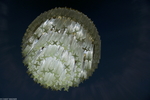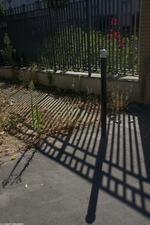The Smell of Monsieur Kaplan's Bookstore ≈ Remembrance on Book Lover's Day {Scented Thoughts}
The Smell of Monsieur Kaplan's Bookstore
One of the most characteristic smells of my childhood that I can recall distinctively from an early age is that of the strange aroma which permeated the now defunct bookstore of "Monsieur Kaplan" located on rue de l'Eperon, where the lycée Fénelon stands. Today is National Book Lovers' Day. It motivates me to recapture at long last some of the memories of a place and time and person whose only traces are left in an architectural shell of the past, and in memories - some of those my own as a child...
At that time, I was attending the primary school of la rue du Jardinet, a stone's throw away from the bookstore, which itself was a stone's throw away from the lycée Fénelon, where I would be studying later on when I grew up. Not that it was my destiny. It's just what happened at another time.
"Monsieur Kaplan" as I called him in my mind, kept a bookstore on the first floor - or rez-de-chaussée in French - of a classical old Parisian building of intimate proportions. You entered the bookstore through a courtyard with mossy cobblestones. A short flight of steps later you were inside what I remember at once as a spacious and cluttered temple dedicated to the love and knowledge of books protected from overly harsh light by jalousies and from obvious logic by serpentine cataloguing of books here and there, meandering mounds of choice tomes, pyramids of bookish knowledge fragile yet sturdy, and corners of secrecy where passionate bibliophiles could hope to suddenly excavate, with a sense of barely suppressed triumph, a gem forgotten by all save one.
That one person in particular was often my father, an avid book collector since a young age, ready to ruin himself for shelves and shelves of books, all important to him. Or so my grand-mother would tell us as if explaining a curse which had befallen our family of which we ought to be aware. To this day, he has a hawk's eye for detecting bibliographic rarities, where others just see a pile of old, indifferent-looking books.
To keep abreast of erudite production, a necessary stop on the way home often involved visiting Monsieur Kaplan or « Kaplan » to see what were the lastest arrivals. I felt a bit shy but Monsieur Kaplan knew how to break ice with my demographic group and each time would, precise as clockwork, retrieve a flat box of chocolates from a drawer in his wooden writing desk by a leafy window and offer me « Chocolettis », often filled with pistachio cream. After that, interminable palabers ensued between grown-ups in the stratosphere above my head and level of understanding. I had all the time in the world to absorb the atmosphere of the place and the smells.
Ah, that Smell! It was the essence of a unique place for a child.
The place was old like Kaplan, a corpulent man in his sixties or seventies with a semi-bald head of white hair and a shiny scalp. It was serious-looking like him too, who would be wearing a suit. Finally, it was Russian like its owner.
The bookstore was an island of Russian and Soviet culture in Paris and a Russophiles' den tucked away in a confidential area of the Latin Quarter, when book stores were still more numerous than clothing stores in the area. It was called Dom Knigi, The House of Book, like the eponymous Soviet institutional bookstores, but it was privately owned. Later, Monsieur Kaplan's descendants would open a Russian tea house where once books wafted away the smell of their decomposition.
The bookstore was like a temple where an incense perfumed with the scent of « Soviet Books » burned inceasingly. Where does that fragrance come from exactly ? It is pungent. Books made in the USSR do not smell like other books. The smell could lead you to them even in the dark and even if you were blind. Curiously, they all smell the same. They monolithically smell of Soviet books. They smell like the essence of a country to foreign noses. That was clear to me.
In honor of Mr Kaplan and of National Book Lover's Day and of book-lovers worIdwide, I randomly pulled out a copy of Etnografija Narodov SSSR by S. A. Tokarev to check on that legendary smell again - and here it is.
Is it the paper, the ink, the glue, the varnish on the cover ? When I inhale non-printed pages even close to the joint, the smell is not that strong. The scent becomes more characteristic when you go to the printed pages. I assume therefore that the ink makes up probably a great part of the olfactory profile of the scent evoking « Soviet Books ». Published in 1958, the tome still smells fresh - and Soviet. It reminds me of those religious books scented with musk, which have managed to keep their scents for centuries.
There is the scent of yellow paper, i.e . ageing paper, i.e. Lignin. There is also a goat-y nuance to the smell, which positions the smell of Soviet Books as being animalic and a bit barnyard-like. Each double page is like an air-freshener called Old Books - Soviet-Style.
The cover of painted grey toile smells sweet, almost cake-like. It's very pretty. This is where the Vanillin aspect of Lignin contained in ageing old books is most transparent to the nose set out on an empirical mission to smell the different parts of a Soviet tome.
The endpapers smell slightly different, like sweet rice and cookie, with a faint hint of rum. Landing on the title page, the form « Old Soviet Books » takes shape in the air as the most characteristic scent of Soviet books and bookstores ; this is where inks have been tattooed in the paper, baby-blue and black. The Smell hovers above the surface of the pages much more than near the inner hinge, so the printer's ink is key, not the glue. Some have been reminded of fish glue.
You go deeper inside the book and it reaches that olfactory threshhold where it starts smelling of smoky barbecue. When I compare the texts with the photographs, the smell of the pictures is stronger because the concentration of ink is higher. It smells a bit acidic too.
I am getting a near-migraine smelling all that Soviet, Khrushchev-era ink and yellowing paper. Soviet paper has been described as cheap and made up of ground wood in large proportion. But there I have it, an evocation of the past, of Mr Kaplan's bookstore, of his kindness which made him think of children, of his favorite brand of chocolates - which would also contain vanilla - of the mustiness of books which echoed the mossiness of the courtyard stones. All that thanks to smells and memories and books.
I hope that you too have a Mr Kaplan in your memories, someone who was able to create an affective link to books for you and to the smells they release when you open them and cherish them.









